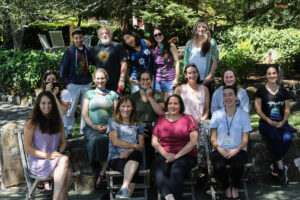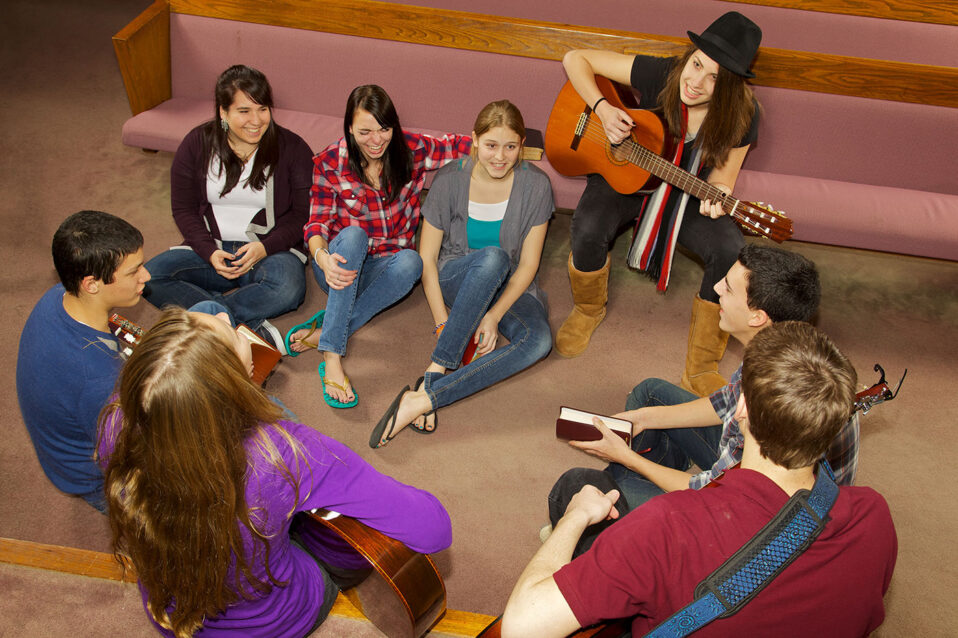By Caryn Roman, a Jewish LearningWorks guest blogger and a Voices for Good program participant. This post originally appeared in longer form at eJewishPhilanthropy.com.
Watching the horrendous attack on Congregation Beth Israel in Colleyville, Texas, unfold in January 2022, I marveled along with the rest of the world at Rabbi Charlie Cytron-Walker’s impressive crisis-management instincts. Charlie found himself at the center of an unfathomable situation, as many others in Jewish communal leadership positions have in recent years. The responses an individual has in these moments are the culmination of a lifetime’s experiences. For leaders like Charlie, myself, and countless others in positions of Jewish communal leadership today, the formative leadership experiences that guide everything we do today happened in Reform Jewish teen programs.
The whole Jewish community surely wants to raise up continual generations of experienced, enthusiastic leaders like Charlie. The demand will only grow in the years to come. Unfortunately, as in the rest of the world, we have a supply chain problem. The realities of social, economic, and institutional changes over the past several years, even before the pandemic, shut down many of the programs once available to Reform Jewish teens like me and Charlie. Programs such as NFTY, Kutz Camp, and local and synagogue-based youth groups gave teens opportunities to lead, provided mentoring from clergy and other trusted adults, connected teens from Reform communities with similar interests across geographic and social boundaries, and identified a pool of young people in whom the spark of communal service and leadership had already been kindled and could be further nurtured as they became adults.

I am in no way suggesting that these programs were or are the sole path to leadership, or that teens who weren’t attracted to these programs for one reason or another did not have equal potential to become leaders later, or in other settings. I am asserting that, absent the natural pipeline of engaged and enthusiastic young people who populated these settings, the task of raising the next generations of Reform Jewish lay and professional leadership has become much more difficult.
Looking around at the current leadership of the Reform Movement (and beyond) – including so many to whom we turned for comfort and community as events in Colleyville unfolded – you’ll find thousands of people in lay and professional leadership roles who can describe similar youth experiences. They’ll recall a tap on the hand by an older peer or trusted adult who said “you have a place here” and gave them concrete ways to develop. Those teen experiences led us to make choices about where to spend our time, where to focus our educational and professional goals, which political causes to support, and how to be involved with the Jewish community as adults. Some of us looked to the bima, aspiring to clergy careers. Others, like me, leaned toward education, hoping to provide new generations with access to Judaism and Jewish tradition in the ways that inspired us. Still others became lawyers, doctors, coders, accountants, librarians, musicians, artists and writers, returning to Reform Jewish spaces as lay leaders. Regardless of the particular way we each translated our experiences, taking on leadership in a teen environment started us on the path to inherit the mantle of leadership in the Reform Movement as adults.
In this moment of strife and change, our community needs leaders. We need people who want to imagine a better future and plan how to get there. We need people who will make smart decisions about how our institutions should be run, and about how we should build and adapt and innovate. And I’m not sure where we will find them.
I believe it falls to us, the Gen-Xers and Millennials who recognize how these influential youth experiences brought us to this moment, to take up the mantle. Those of us who lead and work in congregations must prioritize identifying, nurturing and mentoring young leaders. We need to look beyond the walls of our institutions and build partnerships with other Jewish and secular organizations who offer specific and skills-based leadership training that helps teens build a foundation for active leadership as adults. Most crucially, we need to foster relationships between teens and trusted adults who are models of active lay and professional leadership in all areas of Jewish life. We need to share the stories and invoke the names of those who came before us, who inspired us, and encourage our youth to envision a future where their name sits in the same echelon. If we truly care about having leaders like Charlie in our institutions in 2042, 2052, and beyond, we have to start now.
If you or someone you know wants to contribute to an ongoing conversation about the future of Reform Movement leadership, please fill out this online form to share your information.
About the Author, Caryn Roman
Caryn Roman is a Brooklyn-based Jewish educator, currently serving as Assistant Director of Lifelong Learning at Congregation Emanu-El of the City of New York, a flagship Reform institution. She is a product of the Union for Reform Judaism’s (URJ) local, regional and North American youth programs, through which she had numerous opportunities for leadership beginning at a young age. Caryn spent the first decade of her career working in URJ youth and camping programs and is an alumna of the School of Education at HUC-JIR, the Reform Movement’s academic, spiritual, and professional leadership development institution.



